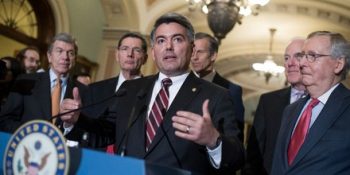|
FORT COLLINS — Colorado State University hurricane researchers are predicting a slightly below-average Atlantic hurricane season in 2017, citing the potential development of El Niño as well as recent anomalous cooling in the tropical Atlantic as primary factors.
A weak La Niña this past winter has dissipated, and there is the potential that a weak to moderate El Niño could develop by the peak of the Atlantic hurricane season. El Niño tends to increase upper-level westerly winds across the Caribbean into the tropical Atlantic, tearing apart hurricanes as they try to form. In addition, most of the North Atlantic has anomalously cooled over the past month, and the tropical Atlantic is now slightly cooler than normal. In addition to providing less fuel for tropical cyclone formation and intensification, cooler tropical Atlantic sea surface temperatures are associated with a more stable atmosphere as well as drier air, both of which suppress organized thunderstorm activity necessary for hurricane development.
11 named storms
The CSU Tropical Meteorology Project team is predicting 11 named storms during the Atlantic hurricane season, which runs from June 1 to November 30. Of those, researchers expect four to become hurricanes and two to reach major hurricane strength (Saffir/Simpson category 3-4-5) with sustained winds of 111 miles per hour or greater.
The team bases its forecasts on over 60 years of historical data that include Atlantic sea surface temperatures, sea level pressures, vertical wind shear levels (the change in wind direction and speed with height in the atmosphere), El Niño (warming of waters in the central and eastern tropical Pacific), and other factors.
So far, the 2017 hurricane season is exhibiting characteristics similar to 1957, 1965, 1972, 1976, and 2002. “1957, 1965, 1976 and 2002 had slightly below-average hurricane activity, while 1972 was a well below-average season,” said Phil Klotzbach, research scientist in the Department of Atmospheric Science and lead author of the report.
The team predicts that 2017 hurricane activity will be about 85 percent of the average season. By comparison, 2016’s hurricane activity was about 135 percent of the average season.
The CSU team will issue forecast updates on June 1, July 3 and August 2.
This is the 34th year that the CSU hurricane research team has issued the Atlantic basin seasonal hurricane forecast. Recently, the Tropical Meteorology Project team has expanded to include Michael Bell, associate professor in the Department of Atmospheric Science. William Gray launched the report in 1984 and continued to be an author on them until his death last year.
The CSU forecast is intended to provide a best estimate of activity to be experienced during the upcoming season – not an exact measure.
Bell cautioned coastal residents to take proper precautions.
“It takes only one storm near you to make this an active season,” Bell said.
Landfall probability
The report also includes the probability of major hurricanes making landfall:
42 percent for the entire U.S. coastline (average for the last century is 52 percent)
24 percent for the U.S. East Coast including the Florida peninsula (average for the last century is 31 percent)
24 percent for the Gulf Coast from the Florida panhandle westward to Brownsville (average for the last century is 30 percent)
34 percent for the Caribbean (average for the last century is 42 percent)
The forecast team also tracks the likelihood of tropical storm-force, hurricane-force and major hurricane-force winds occurring at specific locations along the coastal United States, the Caribbean and Central America through its Landfall Probability website.
The site provides information for all coastal states as well as 11 regions and 205 individual counties along the U.S. coastline from Brownsville, Texas, to Eastport, Maine. Landfall probabilities for regions and counties are adjusted based on the current climate and its projected effects on the upcoming hurricane season.
Klotzbach and Bell update the site regularly with assistance from the GeoGraphics Laboratory at Bridgewater State University in Massachusetts.
Funding for this year’s report has been provided by Interstate Restoration, Ironshore Insurance and a grant from the G. Unger Vetlesen Foundation.
EXTENDED RANGE ATLANTIC BASIN HURRICANE FORECAST FOR 2017:
Released April 6, 2017
Tropical Cyclone Parameters Extended Range
(1981-2010 Climatological Median Forecast for 2017
in parentheses)
Named Storms (12)* 11
Named Storm Days (60.1) 50
Hurricanes (6.5) 4
Hurricane Days (21.3) 16
Major Hurricanes (2.0) 2
Major Hurricane Days (3.9) 4
Accumulated Cyclone Energy (92) 75
Net Tropical Cyclone Activity (103%) 85
* Numbers in ( ) represent medians based on 1981-2010 data.
|





